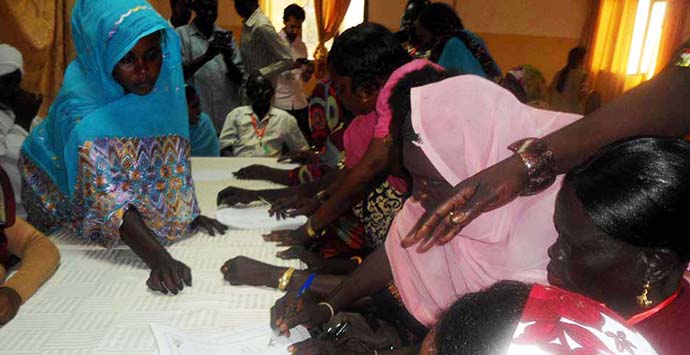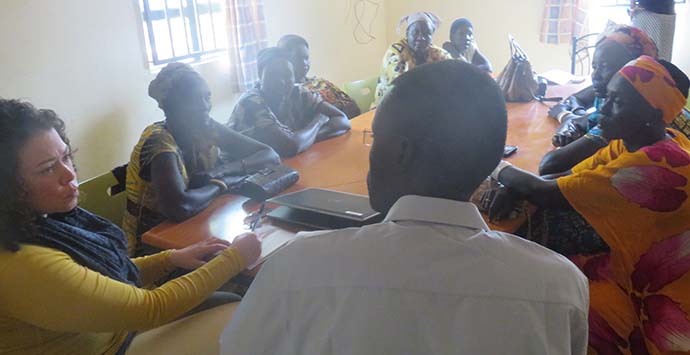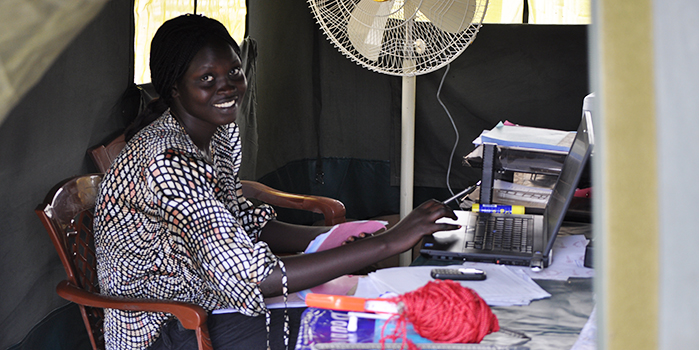#WomenExcel: Securing hope for a better future in South Sudan
More than two million people in South Sudan have fled their homes over the last decade. Many are forced to move over and over again, often walking for days as the war continually shifts its borders and safe places become danger zones overnight. The unequal distribution of economic resources and political power across the country’s diverse population has fuelled the conflict. Women in particular have suffered from a restrictive legal system, conservative social norms and high rates of wartime gender-based violence.
I recently had the opportunity to meet with eight members of the Lakes State Women’s Association, a local women’s organization committed to making a difference in their communities. The meeting was held at one of AECOM’s regional offices in South Sudan that is home to the Viable Support to Transition and Stability (VISTAS) program, implemented in partnership with United States Agency for International Development (USAID).
 Women discussing conflict mitigation strategies related to cross-border issues in South Sudan.
Women discussing conflict mitigation strategies related to cross-border issues in South Sudan.
The purpose of my visit was twofold: to gain an understanding of key issues and gender-based constraints in conflict mitigation, and then to establish ways women can be further integrated into community-based reconciliation activities.
Meeting with the women from the organization and hearing their personal stories gave me tremendous insight into the challenges women face in South Sudan. Each woman shared her opinions and perspectives on the most critical issues facing their community. Some spoke about losing family members in the conflict, while others shared firsthand experiences with gender-based violence and the impact that insecurity has had on their livelihoods.
 Dina Scippa meeting with Lakes State Women’s Association in South Sudan.
Dina Scippa meeting with Lakes State Women’s Association in South Sudan.
After everyone had a chance to speak, one woman raised her hand and said, “Despite all of these stories, it is important for you to know that we have not lost hope.” Even though these women represent various sub-clans that have been in conflict for years, they see the benefit of putting aside their differences for a common goal — hope for a better future.
Although the factors that influence women’s vulnerability are complex, solutions do not have to be. Often, it simply takes allocating the necessary time and resources to ensure that women’s perspectives are heard and incorporated into the design of program activities. AECOM was able to engage women from the community, solicit their opinions and discuss potential solutions for mitigating conflict. After learning about their experiences and hearing their ideas, we are equipped with a more inclusive understanding and are better positioned to design impact-driven activities that respond to the unique needs of both men and women.
 AECOM employee, Saida Rose, from our VISTAS South Sudan Program, working in our regional office in Pibor.
AECOM employee, Saida Rose, from our VISTAS South Sudan Program, working in our regional office in Pibor.
Recognizing that substantial change takes time, AECOM’s projects in South Sudan and beyond have contributed to the conversation about promoting female empowerment and women’s participation in meaningful ways. By taking necessary measures to systematically address gender considerations in our programming, we can find innovative and sensitive ways to foster change, improve outcomes for women and secure hope for a better future.

Dina Scippa is AECOM’s Gender Advisor, working within the global International Development services group. Dina ensures that AECOM’s International Development programming and services address gender and social inclusion considerations in a meaningful and holistic way. She provides technical backstopping to programs globally, including for AECOM’s projects implemented on behalf of the US Agency for International Development (USAID), Australian Government’s Department of Foreign Affairs and Trade (DFAT), Millennium Challenge Corporation (MCC), the UK Department for International Development (DFID), and the European Union. AECOM is one of the world’s largest International Development service providers, with 2,000 corporate and project staff operating in 113 countries.
LinkedIn: Dina Scippa






